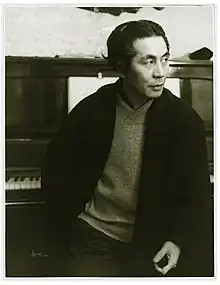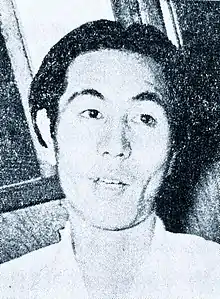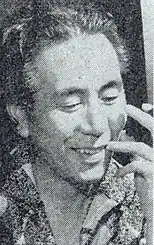Akira Ifukube 伊福部 昭 | |
|---|---|
 Ifukube in 1954 | |
| Background information | |
| Born | 31 May 1914[1] Kushiro, Hokkaido, Empire of Japan[1] |
| Died | 8 February 2006 (aged 91) Tokyo, Japan |
| Genres | Classical, film scores |
| Occupation(s) | Musician, Composer, educator |
| Years active | 1935-2006 |
| Spouse(s) | Ai Yuzaki (dancer) |
| Website | akiraifukube |
Akira Ifukube (伊福部 昭, Ifukube Akira, 31 May 1914 – 8 February 2006) was a Japanese composer. He is best known for composing several entries in the Godzilla franchise as well as developing the titular monster's roar.
Biography
Early years in Hokkaido
Akira Ifukube was born on 31 May 1914, in Kushiro,[1] Japan as the third son of a police officer Toshimitsu Ifukube. The origins of this family can be traced back to at least the 7th century with the birth of Ifukibe-no-Tokotarihime. He was strongly influenced by the Ainu music as he spent his childhood (from age of 9 to 12) in Otofuke near Obihiro, where was with a mixed population of Ainu and Japanese. His first encounter with classical music occurred when attending secondary school in Sapporo city. Ifukube decided to become a composer at the age of 14 after hearing a radio performance of Igor Stravinsky's The Rite of Spring, and also cited the music of Manuel de Falla as a major influence.
Ifukube studied forestry at Hokkaido Imperial University in Sapporo and composed in his spare time, which prefigured a line of self-taught Japanese composers. His first piece was the piano solo, Piano Suite (later the title was changed to Japan Suite, arranged for orchestra), dedicated to George Copeland who was living in Spain. Atsushi Miura, Ifukube's friend at the university, sent a letter to Copeland. Copeland replied, "It is wonderful that you listen my disc in spite of you living in Japan, the opposite side of the earth. I imagine you may compose music. Send me some piano pieces." Then Miura, who was not a composer, presented Ifukube and this piece to Copeland. Copeland promised to interpret it, but the correspondence was unfortunately stopped because of the Spanish Civil War. Ifukube's big break came in 1935, when his first orchestral piece Japanese Rhapsody won the first prize in an international competition for young composers promoted by Alexander Tcherepnin. The judges of that contest—Albert Roussel, Jacques Ibert, Arthur Honegger, Alexandre Tansman, Tibor Harsányi, Pierre-Octave Ferroud, and Henri Gil-Marchex were unanimous in their selection of Ifukube as the winner.[2] Ifukube studied modern Western composition while Tcherepnin was visiting Japan, and his Piano Suite received an honourable mention at the I.C.S.M. festival in Venice in 1938. Japanese Rhapsody was performed in Europe on a number of occasions in the late 1930s.
On completing University, he worked as a forestry officer and lumber processor in Akkeshi, and towards the end of the Second World War was appointed by the Imperial Japanese Army to study the elasticity and vibratory strength of wood. He suffered radiation exposure after carrying out x-rays without protection, a consequence of the wartime lead shortage. Thus, he had to abandon forestry work and became a professional composer and teacher. Ifukube spent some time in hospital due to the radiation exposure, and was startled one day to hear one of his own marches being played over the radio when General Douglas MacArthur arrived to formalize the Japanese surrender.
From 1946 to 2006 in Tokyo

He taught at the Tokyo University of the Arts (formerly Tokyo Music School), during which period he composed his first film score for Snow Trail, released in 1947. Over the next fifty years, he would compose more than 250 film scores, the high point of which was his 1954 music for Ishirō Honda's Toho movie, Godzilla. Ifukube also created Godzilla's trademark roar – produced by rubbing a resin-covered leather glove along the loosened strings of a double bass – and its footsteps, created by striking an amplifier box.
Despite his financial success as a film composer, Ifukube's first love had always been his general classical work as a composer. In fact his compositions for the two genres cross-fertilized each other. For example, he was to recycle his 1953 music for the ballet Shaka, about how the young Siddhartha Gautama eventually became the Buddha, for Kenji Misumi's 1961 film Buddha. Then in 1988 he reworked the film music to create his three-movement symphonic ode Gotama the Buddha. Meanwhile, he had returned to teaching at the Tokyo College of Music, becoming president of the college the following year, and in 1987 retired to become head of the College's ethnomusicology department.
He trained younger generation composers such as Kaoru Wada, Shigeyuki Imai, Satoshi Imai, Toshiro Mayuzumi, Yasushi Akutagawa, Akio Yashiro, Teizo Matsumura, Sei Ikeno, Minoru Miki, Maki Ishii, and Yssimal Motoji. See: List of music students by teacher: G to J#Akira Ifukube. He also published Orchestration, a 1,000-page book on theory, widely used among Japanese composers.
He died in Tokyo at Meguro-ku Hospital of multiple organ dysfunction on 8 February in 2006, at the age of 91 and buried at the Ube shrine in Tottori.
Honors

The Japanese government awarded Ifukube the Order of Culture. Subsequently, he was awarded the Order of the Sacred Treasure, Third Class.[3]
Tribute
On May 31, 2021, Google celebrated the 107th anniversary of his birth with a Google Doodle.[4]
Works
Orchestral/chamber
- Japanese Rhapsody (1935)
- Triptyque Aborigène: trois tableaux pour orchestre de chambre (1937); dedicated to Alexander Tcherepnin.
- Ballet symphonique après Etenraku (1940)
- Symphony Concertante for piano and orchestra (1941)
- Ballata Sinfonica (1943)
- Overture to the Nation of Philippines (1944)
- Arctic Forest (1944)
- Rapsodia Concertante for violin and orchestra (Violin Concerto No. 1) (1948, revised 1951/59/71)
- Salome, ballet (1948, score revised and expanded 1987 for Suite)[5] based on Oscar Wilde's play
- Fire of Prometheus, ballet (1950)
- Drumming of Japan, ballet (1951, revised 1984)
- Sinfonia Tapkaara (1954, revised 1979)
- Ritmica Ostinata for piano and orchestra (1961, revised 1971)
- Ronde in Burlesque for wind orchestra (1972, arranged to orchestra in 1983)[5]
- Violin Concerto No. 2 (1978)
- Lauda concertata for marimba and orchestra (1979)
- Eglogue symphonique for 20-strings koto and orchestra (1982)
- Symphonic Fantasia No. 1 (1983); arrangement from the film scores
- Symphonic Fantasia No. 2 (1983); arrangement from the film scores
- Symphonic Fantasia No. 3 (1983); arrangement from the film scores
- Gotama the Buddha, symphonic ode for mixed chorus and orchestra (1989)
- Japanese Suite for orchestra (1991); arrangement from the piano suite
- Japanese Suite for string orchestra (1998); arrangement from the piano suite
Instrumental
- Piano Suite (1933)
- Toka: Cantilena ballabile sul mode antico de Giappone, for guitar (1967)
- Kugoka for guitar (1969)
- Toccata for guitar (1970)
- Fantasia for baroque lute (1980)
- Sonata for violin and piano (1985)
- Ballata sinfonica for duo-treble and bass 25-stringed koto (2001)
Vocal
- Ancient Minstrelsies of Gilyak Tribes, for soprano and piano (1946)
- Three Lullabies among the Native Tribes on the Island of Sakhalin, for soprano and piano (1949)
- Eclogues after Epos among Aino Races, for soprano and timpani (1950)
- A Shanty of the Shiretoko Peninsula (1961)
- The Sea of Okhotsk for soprano, bassoon, piano (or harp) and double bass (1988)
- Tomo no oto for traditional ensemble and orchestra (1990)
- Lake Kimtaankamuito (Lake Mashū) (摩周湖, Mashū-ko) for soprano, viola and harp or piano (1992)
- Five Poems after Inaba Manyo (1994); text by Ōtomo no Yakamochi
- La Fontaine sacrée for soprano, viola, bassoon and harp (1964, 2000); arrangement by the composer from the 1964 film score Mothra vs. Godzilla
- Ao Saghi (Grey heron) for soprano, oboe, double bass and piano (2000); text by Genzō Sarashina
Film scores
| Year | Title | Director(s) | Notes |
|---|---|---|---|
| 1947 | Snow Trail | Senkichi Taniguchi | |
| Kôfuku eno shôtai | Yasuki Chiba | ||
| Meitantei Hiroshi kun | Hideo Sekigawa | Short film | |
| 1948 | Daini no jinsei | Hideo Sekigawa | |
| Kuro-uma no danshichi | Hiroshi Inagaki | ||
| Woman In the Typhoon Belt | |||
| The President and a Female Clerk | |||
| 1949 | The Quiet Duel | Akira Kurosawa | |
| Late Night Confession | |||
| Jakoman and Tetsu | |||
| Rainbow Man | |||
| Detective Hiroshi | |||
| 1950 | City of the Spider | ||
| White Beast | |||
| Listen to the Student's Memoirs Senbotsu Japan, Voice of Wadatsumi | |||
| Flowers of Seven Colors | |||
| 1951 | Beyond Love and Hate | ||
| Clothes of Deception | |||
| Free School | |||
| The Tale of Genji | Kōzaburō Yoshimura | ||
| 1952 | Children of Hiroshima | Kaneto Shindo | |
| Violence | |||
| Swift Current | |||
| Tenryu River | |||
| 1953 | A Thousand Paper Cranes | ||
| Epitome | |||
| Anatahan | Josef von Sternberg | ||
| White Fish | |||
| Crab Ship | |||
| Hiroshima | Hideo Sekigawa | ||
| 1954 | Sakuma Dam Part One | ||
| Cape Ashizuri | |||
| Muddy Youth | |||
| Godzilla | Ishiro Honda | ||
| Dobu | |||
| 1955 | Ningen Gyorai Kaiten | Shūe Matsubayashi | |
| Women of Ginza | |||
| The Maid's Kid | Tomotaka Tasaka | ||
| Sakuma Dam Part Two: Transformation of the Great Tenryu | |||
| Three Faces | |||
| Kabuki Jūhachiban Narukami: Beauty and the Sea Dragon | |||
| Baruuba | |||
| 1956 | The Burmese Harp | Kon Ichikawa | |
| Wandering Shore | |||
| Onibi | |||
| Sound of the Fog | |||
| The Good Natured Couple | |||
| Godzilla, King of the Monsters! | Terry O. Morse Ishirō Honda | American version | |
| Rodan | Ishirō Honda | ||
| 1957 | Osaka Story | ||
| Advancing Vitamin B1 | |||
| Yagyu Secret Scrolls | |||
| Sakuma Dam Part Three | |||
| Hateful Things | |||
| Who Committed Murder | |||
| The Final Escape | |||
| Bastards of the Sea | |||
| Downtown | |||
| The Ground | |||
| The Mysterians | Ishirō Honda | ||
| 1958 | Yagyu Secret Scrolls: Ninjitsu | ||
| Sorrow Is Only for Women | |||
| A Bridge for Us Alone | |||
| Ice Wall | |||
| Varan the Unbelievable | Ishirō Honda | Japanese version | |
| 1959 | Boss of the Underworld | ||
| Whistling in the Kotan | |||
| Woman and the Pirates | |||
| Tear Down Those Walls | |||
| The Three Treasures | Hiroshi Inagaki | ||
| Battle in Outer Space | Ishirō Honda | ||
| 1960 | Baluchaung Project | ||
| Shinran | |||
| Shinran Continued | |||
| Castle of Flames | |||
| 1961 | The Story of Osaka Castle | Hiroshi Inagaki | |
| Musashi Miyamoto | |||
| Challenge in the Snow | |||
| Buddha | |||
| Hangyakuji | |||
| Different Sons | |||
| 1962 | The Tale of Zatoichi | Kenji Misumi | |
| The Whale God | |||
| King Kong vs. Godzilla | Ishirō Honda | Japanese version[lower-alpha 1] | |
| The Great Wall | |||
| Chūshingura: Hana no Maki, Yuki no Maki | Hiroshi Inagaki | ||
| 1963 | The New Tale of Zatoichi | Tokuzō Tanaka | |
| Wanpaku Ōji no Orochi Taiji | Yūgo Serikawa | ||
| 13 Assassins | Eiichi Kudo | ||
| Zatoichi the Fugitive | Tokuzō Tanaka | ||
| Yoso | |||
| Zatoichi on the Road | Kimiyoshi Yasuda | ||
| Atragon | Ishirō Honda | ||
| 1964 | Teikoku Bank Incident: Prisoner of Death Row | ||
| Mothra vs. Godzilla | Ishirō Honda | ||
| Dogora | Ishirō Honda | ||
| Fight, Zatoichi, Fight | Kenji Misumi | ||
| The Last Woman of Shang | |||
| The Woman Running on the Shore | |||
| Suruga yukyoden | |||
| Ghidorah, the Three-Headed Monster | Ishirō Honda | ||
| Whirlwind | |||
| 1965 | Tokugawa Ieyasu | ||
| Zatoichi's Revenge | Akira Inoue | ||
| Japanese Archipelago | |||
| Frankenstein vs. Baragon | Ishirō Honda | ||
| Invasion of Astro-Monster | Ishirō Honda | ||
| Zatoichi and the Chess Expert | Kenji Misumi | ||
| 1966 | Daimajin | Kimiyoshi Yasuda | |
| Adventure in Kigan Castle | |||
| Zatoichi's Vengeance | Tokuzō Tanaka | ||
| The War of the Gargantuas | Ishirō Honda | ||
| Return of Daimajin | Kenji Misumi | ||
| Thirteen Thousand Suspects | |||
| Daimajin Strikes Again | Kazuo Mori | ||
| 1967 | King Kong Escapes | Ishirō Honda | |
| Eleven Samurai | Eiichi Kudo | ||
| Zatoichi Challenged | Kenji Misumi | ||
| 1968 | The Snow Woman | Tokuzō Tanaka | |
| Destroy All Monsters | Ishirō Honda | ||
| Young Challengers | Yasuki Chiba | ||
| 1969 | Dawn of the Skyscraper | ||
| The Devil's Temple | |||
| Latitude Zero | Ishirō Honda | ||
| 1970 | Zatoichi Meets Yojimbo | Kihachi Okamoto | |
| Space Amoeba | Ishirō Honda | ||
| Will to Conquer | |||
| 1972 | Godzilla vs. Gigan | Jun Fukuda | Stock music |
| 1973 | Zatoichi's Conspiracy | ||
| The Human Revolution | |||
| 1974 | The Last Samurai | Kenji Misumi | |
| Sandakan No. 8 | |||
| 1975 | Terror of Mechagodzilla | Ishirō Honda | |
| The Door Has Opened | |||
| 1976 | The Great Elm | ||
| 1977 | The Sea, the Wings and Tomorrow | ||
| 1978 | Ogin-sama | Kei Kumai | |
| 1991 | Dozoku no ranjo | ||
| Godzilla vs. King Ghidorah | Kazuki Ōmori | ||
| 1992 | Godzilla vs. Mothra | Takao Okawara | |
| 1993 | Godzilla vs. Mechagodzilla II | Takao Okawara | |
| Kushiro Marshland | |||
| 1994 | Godzilla vs. Spacegodzilla | Kensho Yamashita | Stock music |
| 1995 | Godzilla vs. Destoroyah | Takao Okawara | |
| 1999 | Godzilla 2000 | Takao Okawara | Stock music |
| 2000 | Godzilla vs. Megaguirus | Masaaki Tezuka | Stock music |
| 2001 | Godzilla, Mothra and King Ghidorah: Giant Monsters All-Out Attack | Shusuke Kaneko | Stock music |
| 2004 | Godzilla: Final Wars | Ryuhei Kitamura | Stock music |
| 2007 | Tetsujin 28-gô: Hakuchû no zangetsu | Yasuhiro Imagawa | Posthumous score |
| 2016 | Shin Godzilla | Hideaki Anno Shinji Higuchi | Stock music |
| 2019 | Godzilla King of the Monsters | Bear McCreary Michael Dougherty | Original themes |
| 2023 | Godzilla Minus One | Takashi Yamazaki | Original themes |
Awards and honours
Ifukube obtained the Medal with Purple Ribbon in 1980, the 3rd class Order of the Sacred Treasure in 1987, and was honoured as a Person of Cultural Merit in 2003.[7]
Notes
References
- 1 2 3 Ryfle 1998, p. 48.
- ↑ liner notes: Naxos 8.555071 (Morihide Katayarna)
- ↑ L'Harmattan web site (in French)
- ↑ "Akira Ifukube's 107th Birthday". Google.com. 31 May 2021.
- 1 2 Homenick, Erik. "Discography – Concert Works". Akiraifukube.org. Retrieved 3 April 2016.
- ↑ Ryfle 1998, p. 89–90.
- ↑ "伊福部昭音楽資料室" [Akira Ifukube Music Library]. Town of Otofuke. Archived from the original on 23 January 2022. Retrieved 17 April 2023.
Sources
- Ryfle, Steve (1998). Japan's Favorite Mon-star: The Unauthorized Biography of "The Big G". ECW Press. ISBN 9781550223484.
External links
- Official website (archived version)
- Akira Ifukube at IMDb
- A guide to Ifukube's concert music on CD
- Information about his death in Japanese Archived 17 February 2007 at the Wayback Machine
- AKIRAIFUKUBE.ORG:A virtual museum dedicated to Akira Ifukube
- Larson, Randall D. "Voice of Gojira: Remembering Akira Ifukube". Archived from the original on 18 April 2008. Retrieved 22 May 2006. at musicfromthemovies.com
- Milner, David. Yohihiko Shibata (trans.) December 1992 & December 1993. "The Complete Akira Ifukube Interview", Kaiju Fan Online.